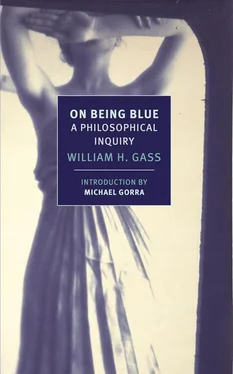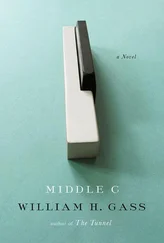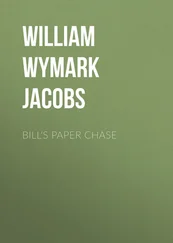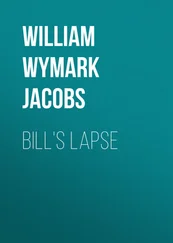William H. Gass
On Being Blue: A Philosophical Inquiry
WILLIAM H. GASS (b. 1924) is an essayist, novelist, and literary critic. He grew up in Ohio and is a former professor of philosophy at Washington University. Among his books are six works of fiction and nine books of essays, including Tests of Time (2002), A Temple of Texts (2006), and Life Sentences (2012). New York Review Books will republish his story collection In the Heart of the Heart of the Country (1968) in 2014. Gass lives with his wife, the architect Mary Gass, in St. Louis.
MICHAEL GORRA’s Portrait of a Novel: Henry James and the Making of an American Masterpiece (2012) was a finalist for both the Pulitzer Prize and the National Book Critics Circle Award in Biography. His earlier books include After Empire: Scott, Naipaul, and Rushdie (1997) and The Bells in Their Silence: Travels Through Germany (2004). He has taught at Smith College since 1985, where he is now the Mary Augusta Jordan Professor of English. He lives in Northampton, Massachusetts, with his wife and daughter.
SAY IT. Go ahead, stand before the mirror, look at your mouth, and say it. Blue . See how you pucker up, your lips opening with the consonants into a kiss, and then that final exhalation of vowels? Blue . The word looks like what it is, a syllable blown out into the air, and with the sound and the sight of saying it as one. You blew blue, though let’s pause a while before getting on to that , and try it out in the other languages you might claim to know. Bleu . But it’s just not the same, your lips don’t purse as much, the eu cuts the syllable short where the ue prolongs it, sustaining it like a piano’s pedal. Blau —that doesn’t work either, and the ow makes the mouth open too far. It’s not quite a howl, it’s a touch too soft for that, and yet it’s a blowsy sound, and untidy. As for azzurro or azul , well, those suggest something else entirely. They might do for the pale milky sky outside my window on this almost cloudy October afternoon; they won’t capture the color of morning glories or the flag.
In none of those other tongues does the word carry the pun or the homonym of the English. None has that mingled note of synesthesia and onomatopoeia; in German “to blow” is the hissing blasen . For blue is not blue, not always, and not even if light at a certain wavelength will show the same thing from Belarus to Brisbane. The French cultural historian Michel Pastoureau has written that while the classical world produced many treatises on the rainbow, neither the Greeks nor the Romans saw blue in its band of celestial shimmer. That bit of light was there all right, but they just didn’t see it, not there. Lucretius gave us a rainbow with only three colors — red, yellow, and violet — and Epicurus added green; Seneca took it up to five, but then Homer’s sea is wine-dark rather than deep blue and so maybe they had a reason.
Oh, of course they knew the color — and they didn’t like what they knew. The ancient Celts would dye their bodies blue for battle, and Pastoureau adds that to the Romans blue eyes in a woman “indicated loose morals”—like red hair in a Victorian novel. Even after Rome was Christianized it still took a few hundred years for caeruleus to seem appropriate for the clothes worn by both God and his mother alike. The virgin made it fashionable, though by the time she put on her mantle it had already found a kind of legitimacy in the sports pages; in the third century C.E. it became a team insignia, and the Blues ran their chariots alongside the rival Reds and Whites. Pastoureau’s own Bleu (2000) offers a compendium of the color’s ever-shifting cultural meanings that takes in everything from ancient Egypt to Yves Klein, and among other things he notes that the American word for a particular kind of music has swum unchanged into other languages: le blues . But that’s not the kind of feeling that the French have whenever Les Bleus lose on the soccer field; the phrase for that is broyer du noir , and you have the blues in black in both German and Italian as well. Some shades of meaning just won’t translate.
That’s not a point William Gass makes. He doesn’t need to. But it’s something you can learn from reading him, from letting yourself drown in On Being Blue . For Gass has an ear like a Pantone chart, exquisitely alert to the semitones of sound and sense, fifty red words here and a hundred greenies over there. His blues themselves are enough to swallow you down, and if you weren’t going to read it in just a few minutes I would quote the entirety of this book’s page-long first sentence, with its rattletrap inventory of some few of the things that particular color can be, the “Blue pencils, blue noses, blue movies, laws, blue legs and stockings… beards, coats, collars, chips and cheese… watered twilight, sour sea.” Russian cats are blue, and oysters, the Social Register too, and it is also, he says, the color of “everything that’s empty,” which makes me remember the high windows that Philip Larkin opens onto “the deep blue air, that shows / Nothing, and is nowhere, and is endless.”
With its three separate sets of parentheses and its grab bag of semicolons and ellipses, Gass’s extraordinary sentence is at once ungainly and balanced, a patter song of rickety improvised perfection, and free. Even so… why blue? He never says, not in these pages, though in interviews he has offered some glimmer of motivation. Gass told The Paris Review , in 1976 (the same year that this book was first published), that he wanted to explore “the way in which meanings are historically attached to words: it is so accidental, so remote, so twisted. A word is like a schoolgirl’s room — a complete mess — so the great thing is to make out a way of seeing it all as ordered.” In another interview he said that “the title and the word were what interested me, not the subject.” In the beginning was the word not the color, not the shade that the spectrum places alongside green, but rather the sound and all that clumps around it, the fuzz balls of meaning that it’s picked up as it has rolled on through time. For Gass stands as a fellow traveler in the linguistic turn of that period’s academic criticism. The real subject of On Being Blue is language itself, which he sees as glorious to the exact degree that it is also inadequate, unable to sustain an immediate relation between a word on the one hand and its arbitrary and yet indissoluble referent on the other. All words are figurative; no blue is ever just blue. But that’s a trivial point, or at least it is when I put it so bluntly. The wonder lies in the way Gass works it all out, and anyone reading both this book and his interviews is likely to call him a liar. Because blue does matter to him. It matters far more than red or green or yellow, and precisely because it comes in so many different flavors and tonalities, because more shades of emotion and meaning have stuck themselves upon it. So “Praise is due blue, the preference of the bee.”
True enough, and you know that Gass must have had fun with that line’s alliteration and internal rhyme. Still, it’s a bit sententious, as befits a maxim dropped in between allusions to Goethe and Aristotle, and this book is usually up to something more mischievous. For there’s a phrase that he perhaps deliberately does not use, a blue activity that he doesn’t mention as such, even though he both writes about it and provides his own best example. Working blue —the stand-up comedian’s term for the kind of routine one could do in a nightclub but not on television, not in the days when there were still seven words you couldn’t say. Raunch and filth and sex and sweat, the smoke-filled room as smut-filled room. And at moments Gass himself works as blue as Richard Pryor, with something salacious in every moist slippery thought that comes out of his “Quink-stained mouth.” Many poets, he writes, are given to measurement even though they “would never meter their stick,” and John Cleland, the author of Fanny Hill , had such “a deep sense for the blush in blue language” that he managed to produce “a dirty book without a dirty word,” except perhaps in its title. As for Gass’s own title, it is “appropriate that blow and blue should be — at our earliest convenience — utterly confused.”
Читать дальше












